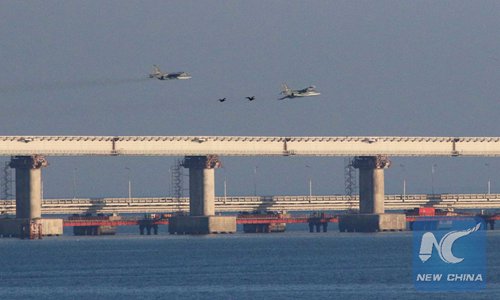Russian scientists sounded the alarm on Wednesday over a huge oil slick in the Black Sea, with the World Wildlife Fund saying at least 100 tons of oil have leaked off the city of Novorossiysk.
After it emerged that the slick was much larger than initially reported, investigators launched a pollution probe and the General Prosecutor’s Office said officials were studying the coast between the town of Anapa and Novorossiysk.
The area is home to the country’s best beaches popular with Russian tourists.
A leak occurred at a sea terminal near the southern port city at the weekend as the Greek-flagged Minerva Symphony was loading oil.
On Monday, the Caspian Pipeline Consortium (CPC), which controls the terminal, said the spill was already contained, estimating that oil had spread over 200 square meters and involved around 12 cubic meters of oil.
By early Sunday, “the situation was back to normal” and posed no threat to either the local population or wildlife, said the consortium. CPC’s shareholders include Russia’s Rosneft, US oil giant Chevron and Italy’s Eni.
The WWF and Russian scientists said the oil slick was much more serious than initially reported and could harm the environment.
The conservation group said it had launched its own surveillance and found the slick had covered an area of 94 square kilometers by Sunday.
Greenpeace, which said it was asking for more information from government officials, claimed the polluted area could be 400,000 bigger than initially reported.
The WWF estimated that at least 100 tons of oil had been released into the Black Sea. “Despite the prompt involvement of rescue teams, the oil spread over a colossal area,” the WWF said on Facebook, adding that marine wildlife could be affected.
Aleksei Knizhnikov, head of the responsible industry program at WWF Russia, said the slick was drifting north, having already reached Abrau-Dyurso, which famed for its wine-making industry, and might later reach the Utrish Nature Reserve.
“We can say that there is no objective information about the scale of the spill on the part of regulatory authorities,” Knizhnikov told AFP.
The Space Research Institute of the Russian Academy of Sciences said it was also monitoring the pollution and citing data from satellite images said that the oil had spread over an area of nearly 80 square kilometers.
“On August 8, the oil slick spread from the shore into the open sea over a distance of 19 kilometers,” the institute said in a statement.
Victoria Glushchenko of Greenpeace Russia said in a statement that if the estimates of the space research institute were correct, “this spill will threaten fish, birds and even the whole marine ecosystems in the area.”
“In addition, the health of people, including those of tourists, who will find themselves in the pollution zone, is at risk,” she added.
Russian jet fighters fly over a bridge connecting the Russian mainland with the Crimean Peninsula after three Ukrainian navy vessels were stopped by Russia from entering the Sea of Azov via the Kerch Strait in the Black Sea, Nov. 25, 2018. (REUTERS PHOTO)



